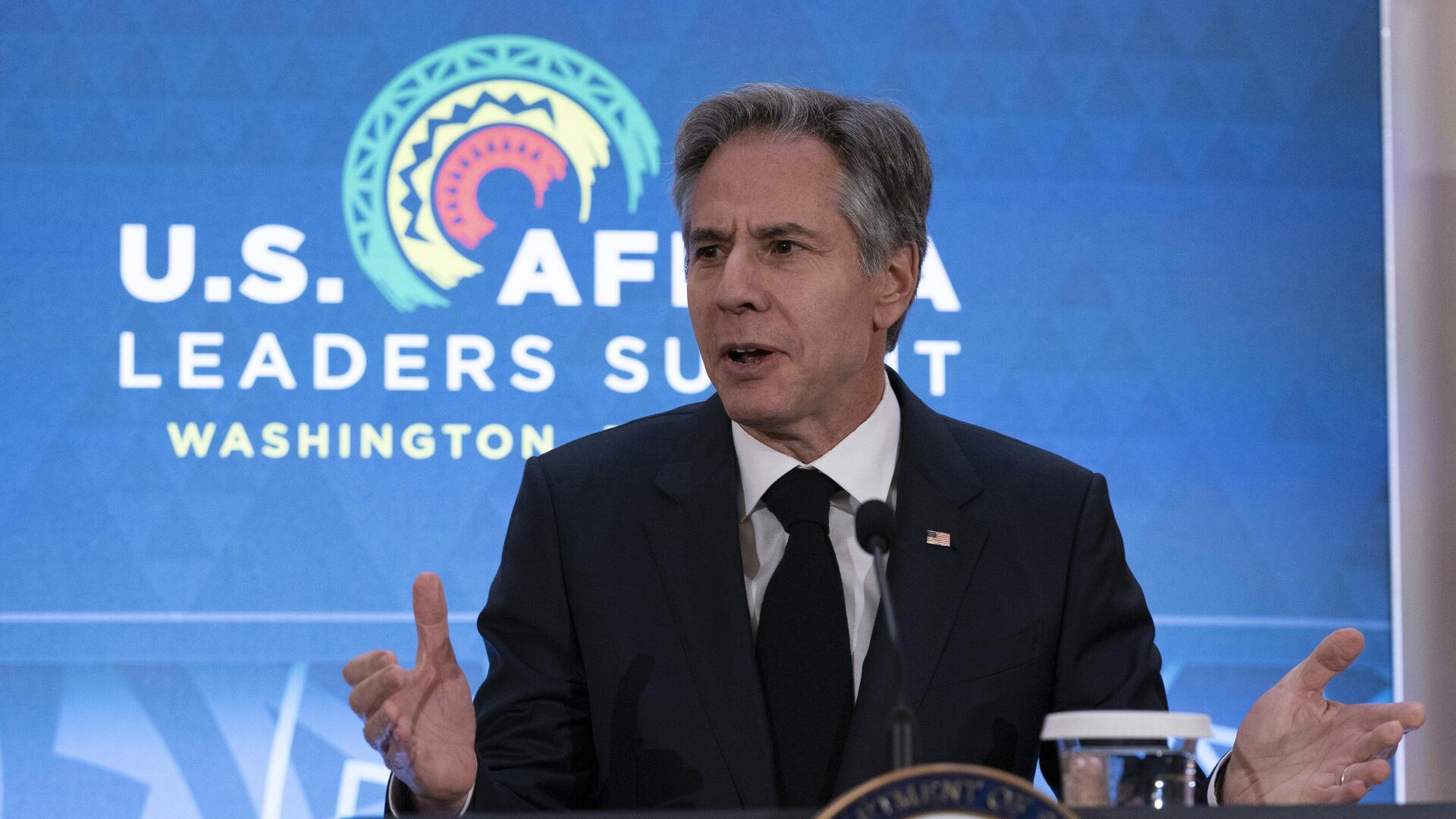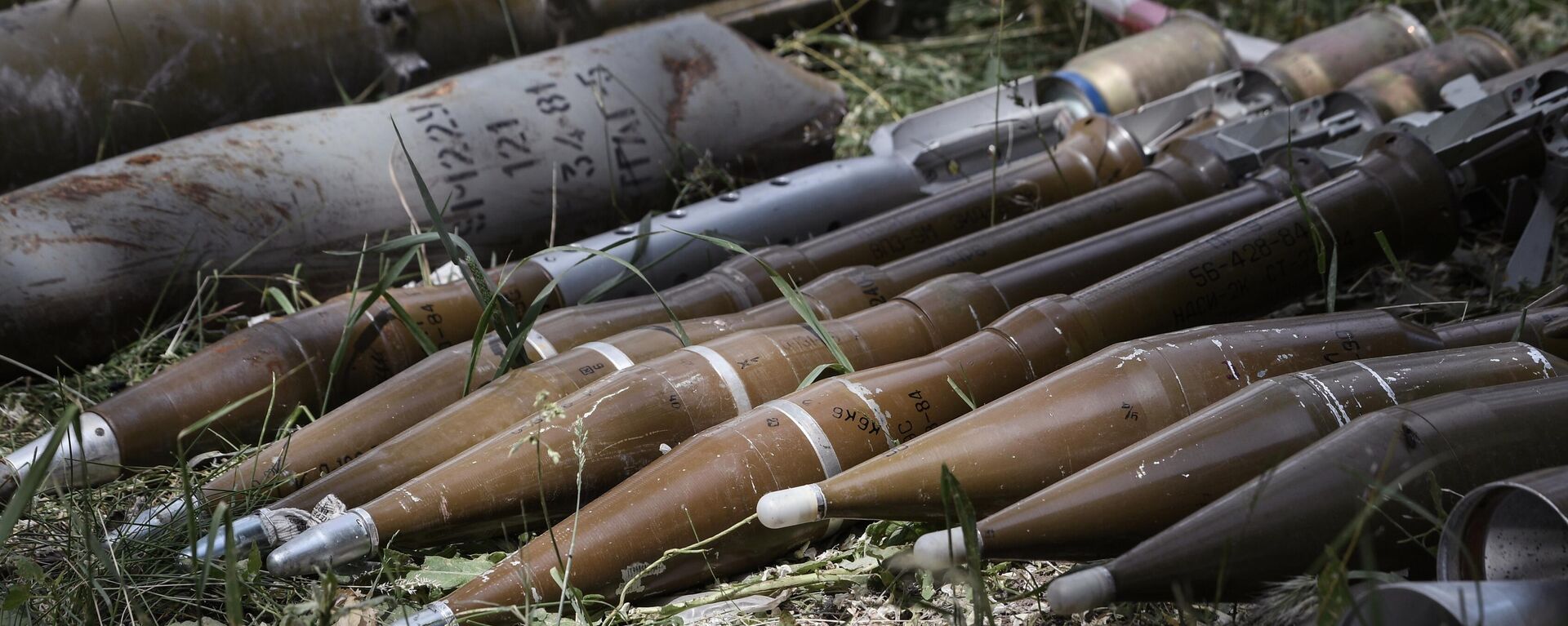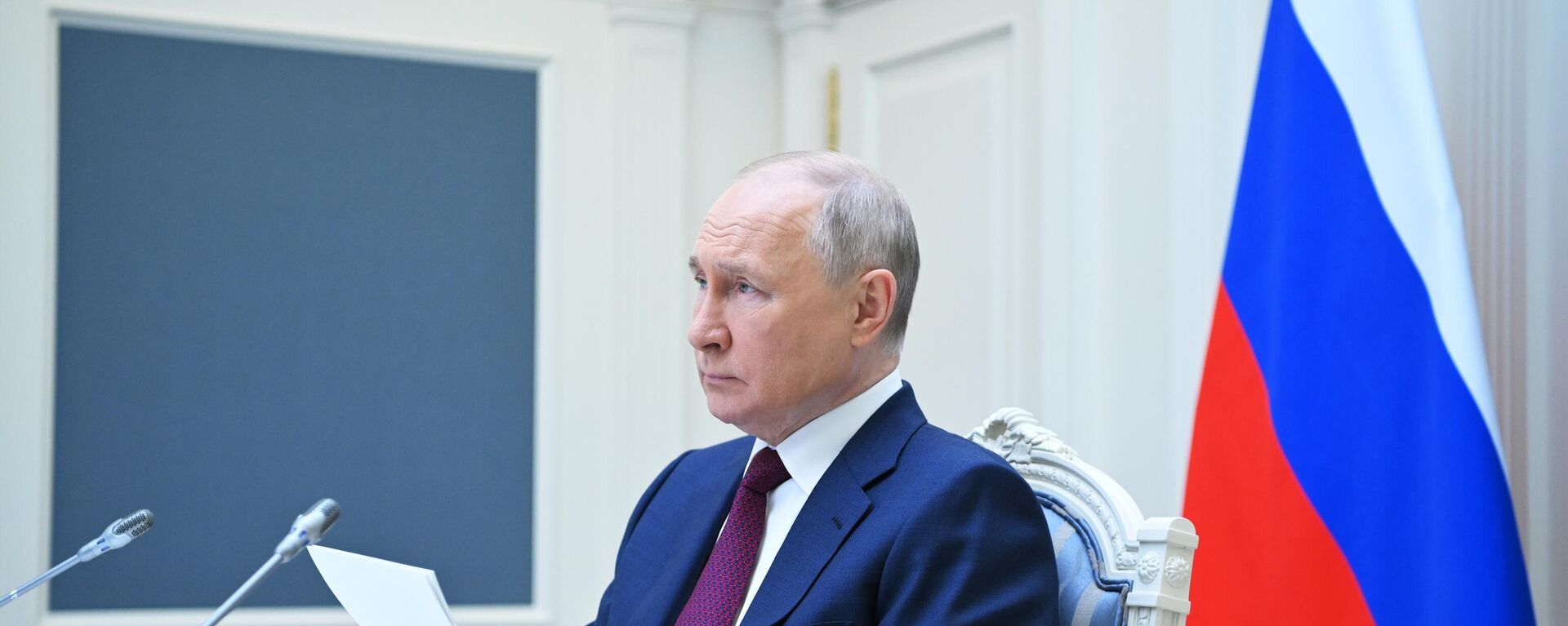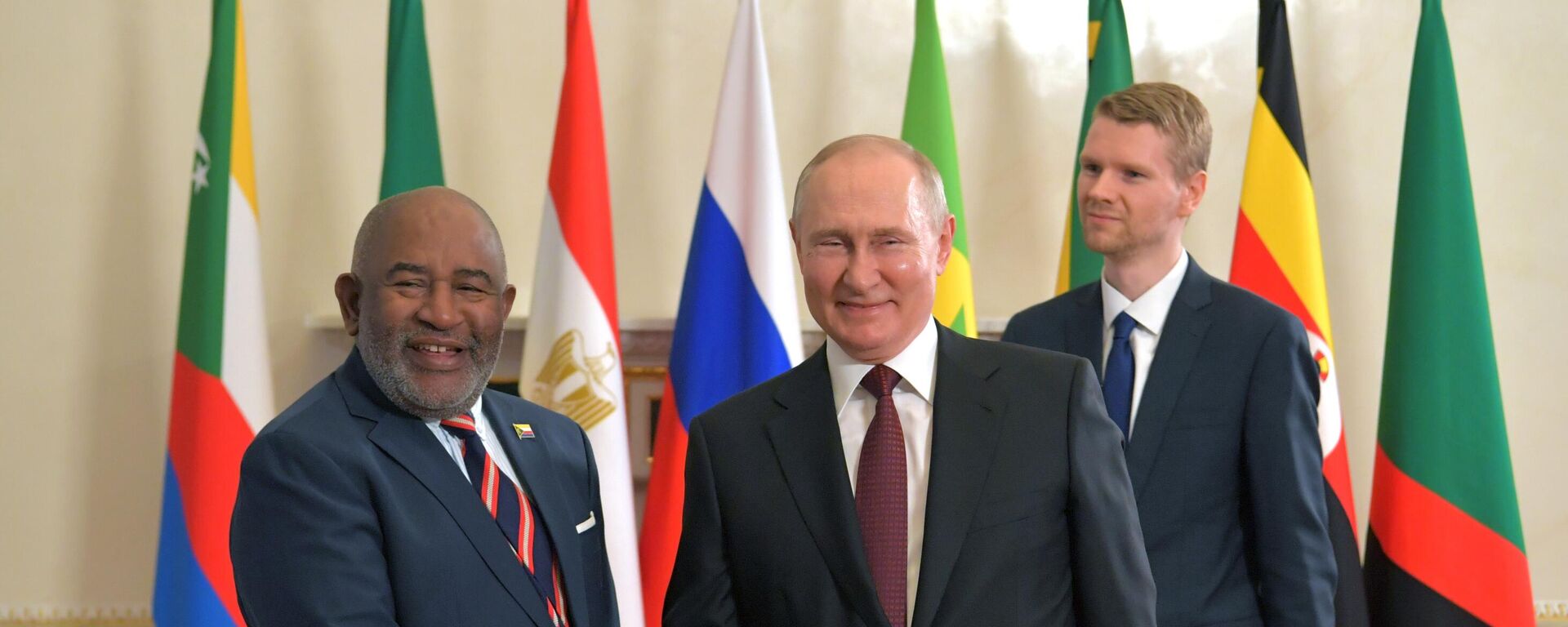https://sputnikglobe.com/20230808/fact-check-debunking-blinkens-fake-news-claims-about-grain-deal-1112462393.html
Fact Check: Debunking Blinken’s Fake News Claims About Grain Deal
Fact Check: Debunking Blinken’s Fake News Claims About Grain Deal
Sputnik International
Russia suspended its participation in the Black Sea Grain Initiative last month, citing the West’s systematic efforts to block the export of Russian food and fertilizers, and the fact that just 3 percent of the Ukrainian grain exported under the grain deal actually went to nations in need.
2023-08-08T15:08+0000
2023-08-08T15:08+0000
2023-08-08T17:05+0000
antony blinken
vladimir putin
russia
ukraine
european union (eu)
rosselkhozbank
us
black sea grain deal
sputnik's fact check
https://cdn1.img.sputnikglobe.com/img/07e6/0c/0d/1105424809_0:0:3071:1728_1920x0_80_0_0_e2f30f4fb216859944552c261de44cfc.jpg
US Secretary of State Antony Blinken has given an interview to a French radio network targeting francophone Africans, making a series of provocative claims against Russia related to the grain deal, and complaining that Moscow’s donation of tens of thousands of tons of food to African countries was just “a drop in the bucket” compared to what’s needed.How much of what Blinken said lines up with reality? Check out Sputnik's fact check of the secretary of state’s remarks to separate facts from falsehoods.Claim: Grain Deal Wouldn’t Have Been Needed If Not for RussiaLeaving to one side the US’ direct responsibility for the Ukraine crisis going back to the 2014 Maidan coup and Washington’s rejection of Russia’s security guarantee proposals on the eve of the conflict in late 2021, Blinken’s comments about why the grain deal “became necessary” are disingenuous at best, and an outright fib at worst.In the spring of 2022, shortly after the Donbass crisis escalated into a full-blown Russia-NATO proxy war in Ukraine, the Russian Black Sea Fleet reported a dramatic uptick in Ukraine’s mining of its own coastline, blocking grain carriers from entering or exiting ports in the country’s southwest. Moscow “categorically” rejected accusations made by the US and its allies that Russia was somehow responsible for grain shipments being blocked, with Foreign Minister Sergey Lavrov pointing out that Western countries themselves had created obstacles to food exports, and were egging on a global food crisis by introducing restrictions on Russian food exports.In June 2022, world wheat market speculators had the wind knocked out of their sails after President Vladimir Putin announced Russia’s hypothetical readiness to see Ukrainian grain exports via the Black Sea resumed. Russia’s position hinged on the need to demine Ukraine’s coasts, an easing of restrictions against Russian food and fertilizer sales abroad, and implicit assurances that the vessels exporting Ukrainian grain wouldn’t be used for weapons or contraband smuggling - assurances which, it turns out, were never kept.Formally signing onto the Black Sea Grain Initiative in July 2022, Moscow emphasized the humanitarian angle of its assent, accepting United Nations negotiators’ arguments that depriving the world of Ukrainian supplies might threaten food insecure nations with hunger. These arguments turned out to be a falsehood as well, but more on this below.Claim: Grain Deal Allowed Ukraine to Export 30 Million Tons of Grain to Hungry NationsThe secretary of state’s figures about the total amount of foodstuffs exported by Ukraine via the Black Sea under the grain deal are in the right ballpark. However, his failure to elaborate where these potential “18 billion loaves of bread” actually went, and the claim that “two-thirds” of wheat exports went to “developing countries” cannot be characterized as anything other than deliberate obfuscation.“Judge for yourselves,” President Putin wrote in an article penned on the eve of last month’s Russia-Africa Summit, while explaining Moscow’s position on suspending its participation in the Black Sea Grain Initiative.The Russian Foreign Ministry presented similar calculations, based on United Nations statistics, revealing that an average of just two World Food Program vessels took part in shipping grain out of Ukraine every month during the period that the grain deal was active, compared with an average of 90 commercial grain carriers. Where Blinken got his “50 percent” or “two-thirds” figures from is anyone’s guess.Worse yet, recent media reports have revealed that much of the grain exported to European countries under the grain deal was used not to make “loaves of bread,” but to feed livestock. In other words, the West not only failed to live up the grain deal’s commitment to provide the Global South with a food security lifeline, but literally spent the exported grain fattening up their pigs and cows, at the expense of both Kiev (which was made to export its food supplies at deep discounts) and the nations that actually needed it.As for Blinken’s claims about prices spiking as a result of Russia pulling out of the grain deal, these too have proven disconnected from reality, with a spike in prices from $635 US per bushel in mid-July to $760/Bu at the end of the month, coming back down to about $645/Bu in this week’s trading, for a total price hike of about 1.5 percent over the past month. So much for Blinken’s “10 to 15 percent” claims.Claim: Russia Had No Reason to Exit Grain DealBlinken’s “record” exports claims aren’t entirely accurate, either, with Russian grain exports actually falling during the 2021-2022 agricultural year (July 1, 2021-June 30, 2022, respectively), hitting 38.1 million tons, compared with 49 million tons in the 2020-2021 season, clearly indicating a slowdown connected in part to Western restrictions as Russian exporters were forced to adjust their business abroad.Russia did set records for grain exports during the 2022-2023 agricultural year, selling 60 million tons of grain worth over $41 billion out of a total harvest of 157.7 million tons, including 104.2 million tons of wheat. But it managed to do so using guerilla methods, including trade in local currencies, and not due to any easing of restrictions by Western countries.Russia, which accounts for up to 20 percent of the world wheat market, exports its wheat and other grain commodities mainly to Africa, the Middle East, Southeast Asia, and Latin America, with major clients including Iran, Egypt, Turkiye, Bangladesh, Saudi Arabia, Kazakhstan, and Azerbaijan. President Putin announced last September that Moscow had delivered up to 30 million tons of grain to nations in Asia, Africa, and Latin America, and was ready to increase deliveries to "50 million or more tons" in the following year.These include restrictions by the US and Europe on loans for the purchase of Russian grain, insurers refusing to provide insurance for shipments, and agricultural equipment producers halting sales to Russia and/or stopping the supply of spare parts. Russia’s agriculture-focused Rosselkhozbank remains disconnected from the SWIFT payment system, which means difficulties in international payments, while the freeze of the foreign assets of Russian companies linked to the transportation of food and fertilizers means additional problems.Although Russia and its partners have managed to reduce the impact of crushing Western restrictions, much more could be done to stabilize prices and assure supplies to the Global South if Moscow wasn’t under the Damocles Sword of US and European sanctions. Mr. Blinken’s assurances are well and good, but Moscow can’t eat assurances – and nor can the countries that depend on Russian food exports not only for their economic welfare, but often for social and political stability as well.Claim: Russia’s Offer of Free Grain Can’t Make Up for Grain DealAs mentioned above, the vast majority of the “20 million tons” mentioned by Blinken (what happened to the “30 million tons” figure, by the way?) was being exported under the grain deal to wealthy Western nations, with less than three percent going to countries in need.Secondly, the “50,000 ton” figure, brought up by Putin during the Russia-Africa Summit and planned to be delivered in the coming three-four months, constitutes Russian targeted food aid to half a dozen African nations: Burkina Faso, the Central African Republic, Eritrea, Mali, Somalia, and Zimbabwe, all of which are food insecure. Along with the direct food aid, Putin said Russia would provide “certain agricultural technologies” to enable Africa to ensure its own food security.
https://sputnikglobe.com/20230718/military-experts-ukraine-used-black-sea-grain-corridor-for-weapons-smuggling-and-terror-attacks-1111972894.html
https://sputnikglobe.com/20230724/putin-pens-article-on-eve-of-russia-africa-summit-full-text--1112102579.html
https://sputnikglobe.com/20230215/ukrainian-wheat-under-grain-deal-was-used-to-feed-spanish-pigs-report-says-1107466231.html
https://sputnikglobe.com/20230727/african-leaders-grateful-to-putin-for-support-on-intl-platforms---african-union-1112177398.html
russia
ukraine
Sputnik International
feedback@sputniknews.com
+74956456601
MIA „Rossiya Segodnya“
2023
News
en_EN
Sputnik International
feedback@sputniknews.com
+74956456601
MIA „Rossiya Segodnya“
Sputnik International
feedback@sputniknews.com
+74956456601
MIA „Rossiya Segodnya“
antony blinken, united states, russia, grain deal, black sea grain initiative, grain, wheat, food, exports, food security, fact check
antony blinken, united states, russia, grain deal, black sea grain initiative, grain, wheat, food, exports, food security, fact check
Fact Check: Debunking Blinken’s Fake News Claims About Grain Deal
15:08 GMT 08.08.2023 (Updated: 17:05 GMT 08.08.2023) Russia suspended its participation in the Black Sea Grain Initiative last month, citing the West’s systematic efforts to block the export of Russian food and fertilizers, and the fact that just three percent of the Ukrainian grain exported under the grain deal actually went to nations in need.
US Secretary of State Antony Blinken has given an
interview to a French radio network targeting francophone Africans, making a series of provocative claims against Russia related to the grain deal, and complaining that Moscow’s donation of tens of thousands of tons of food to African countries was just “a drop in the bucket” compared to what’s needed.
How much of what Blinken said lines up with reality? Check out Sputnik's fact check of the secretary of state’s remarks to separate facts from falsehoods.
Claim: Grain Deal Wouldn’t Have Been Needed If Not for Russia
“First of all, I think we need to put this into the right context. The agreement, which the Russians have torn up for now, should not have been necessary in the first place. This agreement became necessary because Russia decided to invade Ukraine, they blocked Ukraine’s grain exports to the world, particularly through the port of Odessa. Turkiye and the United Nations intervened, and the agreement was implemented over a year ago,” Blinken said.
Leaving to one side the US’ direct responsibility for the Ukraine crisis going back to the
2014 Maidan coup and Washington’s rejection of Russia’s
security guarantee proposals on the eve of the conflict in late 2021, Blinken’s comments about why the grain deal “became necessary” are disingenuous at best, and an outright fib at worst.
In the spring of 2022, shortly after the Donbass crisis escalated into a full-blown Russia-NATO proxy war in Ukraine, the Russian Black Sea Fleet reported a dramatic uptick in Ukraine’s mining of its own coastline, blocking grain carriers from entering or exiting ports in the country’s southwest. Moscow
“categorically” rejected accusations made by the US and its allies that Russia was somehow responsible for grain shipments being blocked, with Foreign Minister Sergey Lavrov pointing out that Western countries themselves had created obstacles to food exports, and were
egging on a global food crisis by introducing restrictions on Russian food exports.
In June 2022, world wheat market speculators had the wind knocked out of their sails
after President Vladimir Putin announced Russia’s hypothetical readiness to see Ukrainian grain exports via the Black Sea resumed. Russia’s position hinged on the need to demine Ukraine’s coasts, an easing of restrictions against Russian food and fertilizer sales abroad, and implicit assurances that the vessels exporting Ukrainian grain wouldn’t be used for weapons or contraband smuggling - assurances which,
it turns out, were never kept.
Formally signing onto the
Black Sea Grain Initiative in July 2022, Moscow emphasized the humanitarian angle of its assent, accepting United Nations negotiators’ arguments that depriving the world of Ukrainian supplies might threaten food insecure nations with hunger. These arguments turned out to be a falsehood as well, but more on this below.
Claim: Grain Deal Allowed Ukraine to Export 30 Million Tons of Grain to Hungry Nations
“While this agreement was in effect, Ukraine exported more than 30 billion metric tons, excuse me, 30 million metric tons of grain. To put it in perspective, for example, that is the equivalent of 18 billion loaves of bread. It has a tremendous impact. Even countries that did not directly receive the grain – and by the way, 50 percent of the exports, two-thirds of the global wheat exports, went to developing countries – but even the countries that did not directly benefit still enjoyed lower, more moderate prices. Since Russia tore up the agreement, prices have risen by 10 to 15 percent for everyone, and of course we see the impact on the countries that previously imported grain directly from Ukraine,” Blinken said.
The secretary of state’s figures about the total amount of foodstuffs exported by Ukraine via the Black Sea under the grain deal are
in the right ballpark. However, his failure to elaborate where these potential “18 billion loaves of bread” actually went, and the claim that “two-thirds” of wheat exports went to “developing countries” cannot be characterized as anything other than deliberate obfuscation.
“Judge for yourselves,” President Putin wrote in an article penned on the eve of last month’s Russia-Africa Summit, while explaining Moscow’s position on suspending its participation in the Black Sea Grain Initiative.
“In almost a year, a total of 32.8 million tons of [food] supplies were exported from Ukraine under the ‘deal,’ with over 70 percent of the exports ending up in high- and upper-middle income countries, including the European Union, whereas such countries as Ethiopia, Sudan and Somalia, as well as Yemen and Afghanistan, received less than 3 percent…i.e. less than one million tons,” Putin wrote.
The Russian Foreign Ministry presented similar calculations, based on United Nations statistics, revealing that an average of
just two World Food Program vessels took part in shipping grain out of Ukraine every month during the period that the grain deal was active, compared with an average of
90 commercial grain carriers. Where Blinken got his “50 percent” or “two-thirds” figures from is anyone’s guess.
Worse yet, recent media reports have revealed that much of the grain exported to European countries under the grain deal was used not to make “loaves of bread,” but to feed livestock. In other words, the West not only failed to live up the grain deal’s commitment to provide the Global South with a food security lifeline, but literally spent the exported grain fattening up their pigs and cows, at the expense of both Kiev (which was made to export its food supplies at deep discounts) and the nations that actually needed it.
As for Blinken’s claims about prices spiking as a result of Russia pulling out of the grain deal, these too have proven disconnected from reality, with a spike in prices from $635 US per bushel in mid-July to $760/Bu at the end of the month, coming back down to about $645/Bu in this week’s trading, for a total price hike of
about 1.5 percent over the past month. So much for Blinken’s “10 to 15 percent” claims.
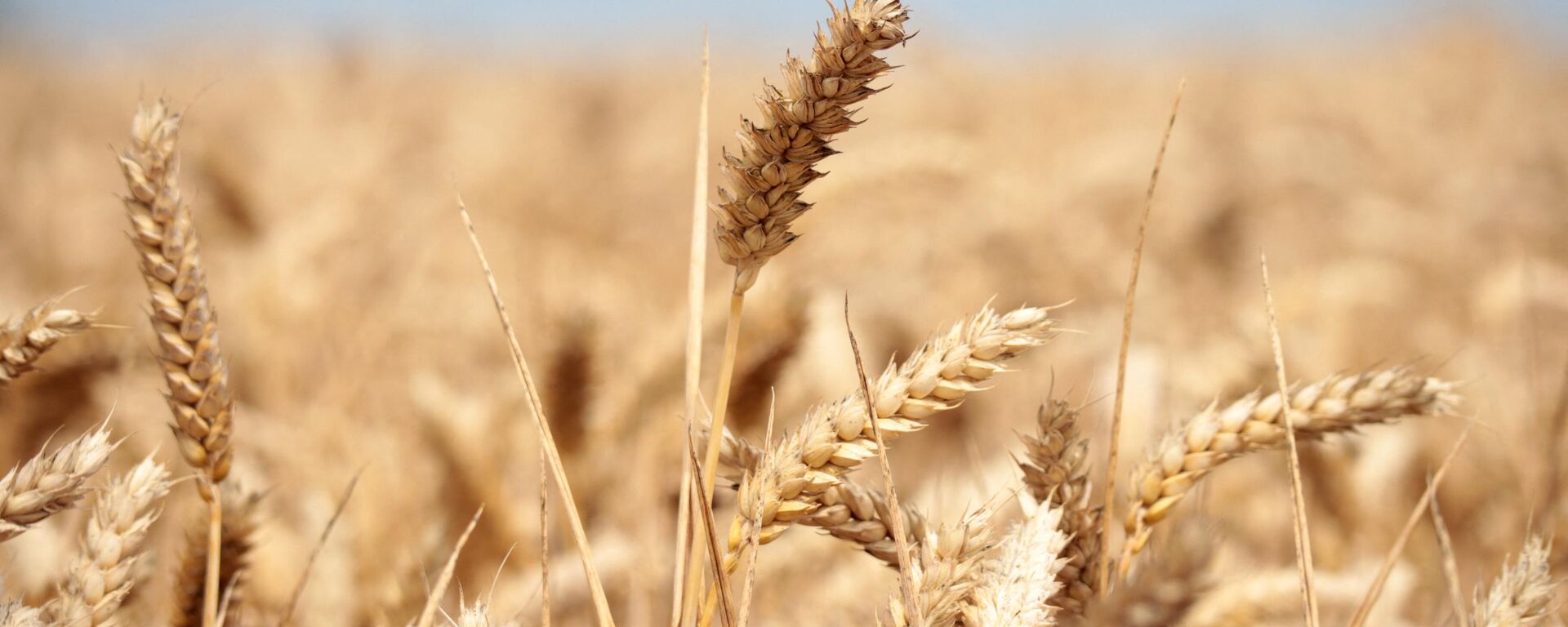
15 February 2023, 21:12 GMT
Claim: Russia Had No Reason to Exit Grain Deal
“Russia claims, for example, that it has problems exporting its own grain, which is false…Russian exports have reached a record level. Well, regarding specific points of potential problems, such as with banks, transportation, etc., we have done everything to ensure that these issues are resolved. For example, I have written letters to our banks, explaining that we absolutely support the export of Russian grain, and that there is nothing to fear from sanctions, which exempt Russian grain, transportation, insurance, etc.,” Blinken said.
Blinken’s “record” exports claims aren’t entirely accurate, either, with Russian grain exports actually falling during the 2021-2022 agricultural year (July 1, 2021-June 30, 2022, respectively), hitting 38.1 million tons, compared with 49 million tons in the 2020-2021 season, clearly indicating a slowdown connected in part to Western restrictions as Russian exporters were forced to adjust their business abroad.
Russia
did set records for grain exports during the 2022-2023 agricultural year, selling
60 million tons of grain worth over $41 billion out of a total harvest of 157.7 million tons, including 104.2 million tons of wheat. But it managed to do so using guerilla methods,
including trade in local currencies, and not due to any easing of restrictions by Western countries.
Russia, which accounts for up to 20 percent of the world wheat market, exports its wheat and other grain commodities mainly to Africa, the Middle East, Southeast Asia, and Latin America, with major clients including Iran, Egypt, Turkiye, Bangladesh, Saudi Arabia, Kazakhstan, and Azerbaijan. President Putin announced last September that Moscow had delivered up to 30 million tons of grain to nations in Asia, Africa, and Latin America, and was ready to increase deliveries to "50 million or more tons" in the following year.
In other words, a number of outstanding issues throttling Moscow’s potential to deliver even more food supplies (and the fertilizers used to make food) to countries in the Global South remain in place, and Russia was able to overcome restrictions in spite of the West's best efforts, not due to leniency on the part of the US or Brussels.
These include restrictions by the US and Europe on loans for the purchase of Russian grain, insurers refusing to provide insurance for shipments, and agricultural equipment producers halting sales to Russia and/or stopping the supply of spare parts. Russia’s agriculture-focused Rosselkhozbank remains disconnected from the SWIFT payment system, which means difficulties in international payments, while the freeze of the foreign assets of Russian companies linked to the transportation of food and fertilizers means additional problems.
Although Russia and its partners have managed to reduce the impact of crushing Western restrictions,
much more could be done to stabilize prices and assure supplies to the Global South if Moscow wasn’t under the Damocles Sword of US and European sanctions.
Mr. Blinken’s assurances are well and good, but Moscow can’t eat assurances – and nor can the countries that depend on Russian food exports not only for their economic welfare, but often for social and political stability as well.Claim: Russia’s Offer of Free Grain Can’t Make Up for Grain Deal
“Russia has apparently expressed the idea of exporting 50,000 metric tons of grain to five or six countries. Under the agreement, which the Russians tore up, we exported 20 million metric tons to developing countries. So, 50,000 tons proposed by Russia vs. 20 million tons exported under the agreement; there’s no comparison. What Russia is proposing is a drop in the bucket. It does not address the problem. It won’t stop the rise in prices. It won’t change the fact that millions of tons of grain were removed from the market and are not available to those in need, especially in developing countries,” Blinken said.
As mentioned above, the vast majority of the “20 million tons” mentioned by Blinken (what happened to the “30 million tons” figure, by the way?) was being exported under the grain deal to wealthy Western nations, with less than three percent going to countries in need.
Secondly, the “50,000 ton” figure, brought up by Putin
during the Russia-Africa Summit and planned to be delivered in the coming three-four months, constitutes Russian targeted food aid to half a dozen African nations: Burkina Faso, the Central African Republic, Eritrea, Mali, Somalia, and Zimbabwe,
all of which are food insecure. Along with the direct food aid, Putin said Russia would provide “certain agricultural technologies” to enable Africa to ensure its own food security.
Nowhere in his remarks did Putin mention that the 50,000 tons in FREE food aid was meant to replace Ukrainian grain supplies’ role – most of which have been ending up in Western countries’ food storage silos anyway. In other words, this was another deliberate obfuscation by Mr. Blinken.
